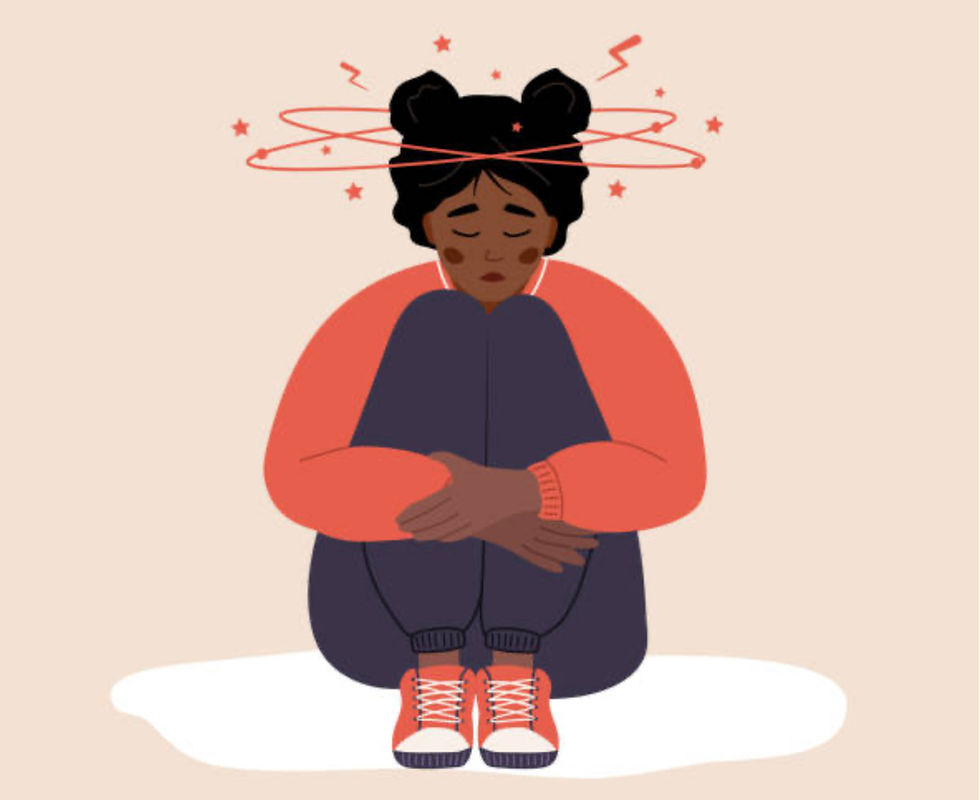From Tabanca to Trauma: The Silent Pain of Heartbreak in the Caribbean Community
- Nada Johnson

- Jul 22, 2025
- 4 min read
Unpacking romantic grief, betrayal, and emotional abandonment in Caribbean relationships and how NJCCS supports real recovery.

💔 “She Catch Real Tabanca”
In Trinidadian and wider Caribbean culture, the term tabanca is often used to describe the emotional distress that follows heartbreak or rejection. It’s treated as both a joke and a rite of passage a dramatic but temporary phase that women are expected to bounce back from (Rohlehr, 2004).
But what if tabanca isn’t just heartbreak? What if it's complex trauma in disguise?
Especially when the relationship involved emotional abuse, betrayal, or years of silent suffering.
Caribbean women are often socialized to prioritize romantic relationships, endure infidelity, and tolerate emotional abandonment for the sake of “keeping a man” (Reddock, 2009). When those relationships end or break down, the grief that follows can be deep, shame-filled, and dismissed.

🧠 When Romantic Grief Becomes Unprocessed Trauma
Research shows that women who experience betrayal trauma, emotional neglect, or coercive control in intimate partnerships often:
Develop complicated grief responses and trauma symptoms (Freyd, 1996; Kaehler & Freyd, 2012)
Experience identity confusion, abandonment fear, and internalized blame (Birnbaum & Fiedler, 2020)
Are more likely to normalize suffering, especially in cultures where heartbreak is minimized or mocked (Davis & Gent, 2021)
This means that tabanca isn’t always harmless.
For many Caribbean women, it’s a warning sign that their emotional wounds need genuine healing, not just temporary distractions like Carnival.

💚 What I Help With:
At NJCCS, I offer a safe and judgment-free space to process Caribbean-specific experiences of romantic grief, including betrayal, gaslighting, and culturally sanctioned heartbreak. I support clients through:
Grief Mapping and Narrative Reframing→ Helps clients unpack the full emotional impact of a relationship's end not just “move on.”
Exploration of Love Scripts and Cultural Myths→ Unpacks beliefs like “a woman must suffer for love” or “he’ll change eventually.”
Betrayal Trauma Support and Nervous System Care→ Treats romantic trauma as legitimate not just “drama.”
Rebuilding Identity After Loss→ Helps clients rediscover who they are without the relationship’s weight.
Relearning What Love Should Feel Like→ Supports healthier models of affection, reciprocity, and peace.

🌿 How This Transforms the Grief Cycle:
Validates Pain Without Shame→ Clients stop downplaying heartbreak and begin naming emotional harm (Kaehler & Freyd, 2012).
Disrupts Toxic Romance Norms→ Clients unlearn scripts that equate suffering with love (Reddock, 2009).
Promotes Nervous System Recovery→ Emotional trauma from betrayal is addressed holistically not just cognitively (Ogden et al., 2006).
Reclaims Deservingness and Self-Love→ Therapy reinforces that you don’t have to earn love by enduring pain.
Models Healthier Relationship Boundaries→ Clients learn to recognize red flags before they become emotional scars.
🕊️ Your Heartbreak Deserves to Be Honored
Tabanca isn’t just something to laugh off.
It can be the doorway to deeper healing.
At NJCCS, you’ll be met with care, not clichés because your heartbreak matters, and so do you.
📧 Contact me at info@nadajohnsonservices.com if this blog spoke to you.
Warm Regards,

Nada Johnson, MSW, RSW
Registered Social Worker, Psychotherapist / trained Family Mediator / EMDR Trained Therapist / Certified Racial Trauma Clinician / Mental Health & Sexual Violence Consultant / Professional Speaker

🌍Website: www.nadajohnsonservices.com
📩 Contact: info@nadajohnsonservices.com
Nada Johnson Consulting & Counselling Services - Online phone and video sessions available
Village Healing Centre: 240 Roncesvalles Avenue
C: 437-887-6146
Click here to join our newsletter and follow our platforms for empowering content, trauma recovery tools, and mental health support. Please share this post to help break the silence around trauma and promote healing in our communities. 🤝
📚 References
Birnbaum, G. E., & Fiedler, M. (2020). Romantic rejection and its emotional consequences. Journal of Social and Personal Relationships, 37(9), 2381–2400.
Davis, D., & Gent, K. (2021). When heartbreak hurts: Romantic betrayal and psychological trauma in Black women. Journal of Black Psychology, 47(4), 277–295.
Freyd, J. J. (1996). Betrayal trauma: The logic of forgetting childhood abuse. Harvard University Press.
Kaehler, L. A., & Freyd, J. J. (2012). Betrayal trauma and relational outcomes in adulthood. Journal of Traumatic Stress, 25(3), 295–301.
Ogden, P., Minton, K., & Pain, C. (2006). Trauma and the body: A sensorimotor approach to psychotherapy. Norton.
Reddock, R. (2009). Caribbean women and love: Cultural histories and contemporary perspectives. UWI Press.
Rohlehr, G. (2004). Calypso and society in pre-independence Trinidad. Lexicon Trinidad Ltd.

Want More Support for Your Professional & Personal Growth?
🔷Try Potential Unlocked™
In addition to counseling, NJCCS offers coaching through our sister brand, Potential Unlocked™, designed specifically for professional women navigating career, leadership, and life transitions.
We support clients with:
Communication and conflict strategy in the workplace
Career development and leadership coaching
Navigating workplace dynamics and burnout recovery
Building confidence in both personal and professional relationships (Online dating empowerment coaching, because personal growth impacts professional life too!)
👉 Visit www.potentialunlocked.ca to learn more or book a free 10-minute consultation call.




Comments